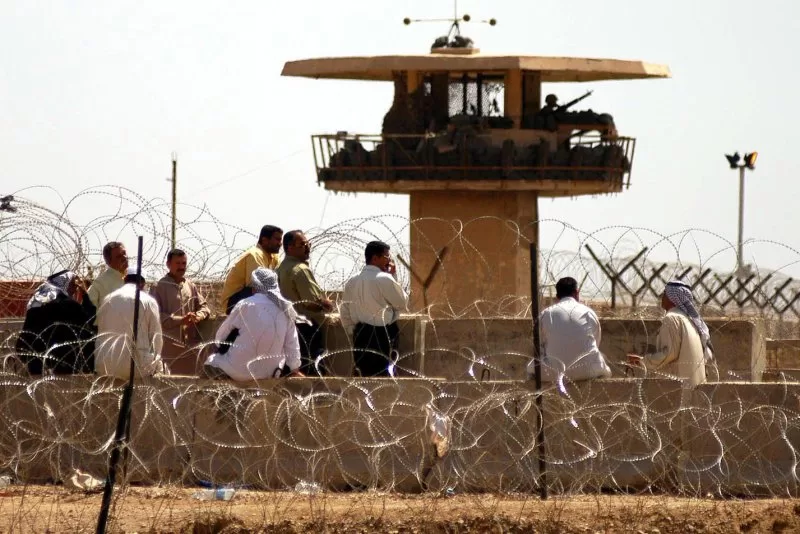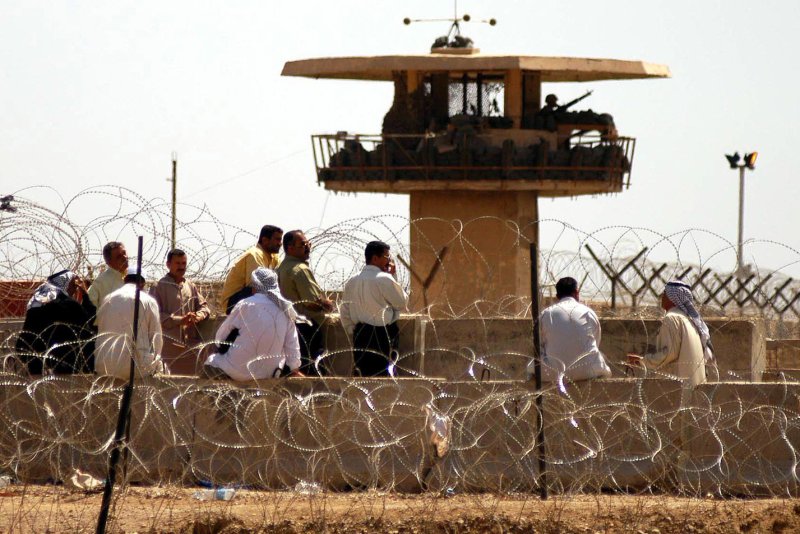Hundreds of Iraqis gather outside of Abu Ghraib prison in Baghdad on May 4, 2004, looking for information about their relatives. On Tuesday, the trial against U.S. military contractor CACI got underway, as three former Iraqi detainees claimed they were repeatedly tortured. File Photo by Hugo Infante/UPI |
License PhotoApril 16 (UPI) — Three former Iraqi detainees, who described being tortured by U.S. military police at Abu Ghraib prison in Iraq in the early 2000s, are finally getting their day in federal court as their trial against a Virginia contractor got underway this week.
Plaintiffs Asa’ad Al-Zuba’e, Suhail Al Shimari and Salah Al-Ejaili are demanding compensation from military contractor CACI Premier Technology, which employed civilian interrogators during the United States’ war on terrorism in Iraq that began in 2003.
The Center for Constitutional Rights filed the lawsuit, on behalf of the three Iraqi prisoners, in 2008. During the past 16 years, CACI has tried to have the case dismissed.
The trial began Monday in U.S. District Court for the Eastern District of Alexandria. The plaintiffs claim interrogators, hired by CACI, threatened them, humiliated them sexually and exposed them to extreme temperatures during their time at Abu Ghraib.
Eleven U.S. soldiers were convicted of abusing inmates between 2003 and 2004 in the Iraqi prison before it was shut down in 2014. Two years later, the U.S. Defense Department released nearly 200 photos showing the torture of military prisoners at Abu Ghraib. The photos showed prisoners with their faces covered, along with cuts, bruises and other lesions.
In Tuesday’s first witness testimony, Al-Zuba’e said he was held at the prison for two months in 2003, and for three days was left in a cell naked, without a mattress or blankets.
“I couldn’t sleep,” Al-Zuba’e testified through a translator. “It was very cold … My feet were swollen. I was crying, screaming and nothing was provided.”
During interrogations, Al-Zuba’e said his head was covered with a hood and he was subjected to electric shocks, as interrogators threatened to rape his wife or hurt his children.
Al-Ejaili said he was taken to Abu Ghraib on Nov. 8, 2003, and that he and other detainees were kept naked 80% of the time.
“My life before was not the same as after that date,” he said through an interpreter, adding he was left naked, with a bag over his head and his hands tied, standing inside a cell throughout the night with no food or water.
Al-Ejaili cried when he recounted how a female military officer brought him women’s undergarments when he asked for clothing.
“I felt humiliated,” Al-Ejaili said. “I wished to die.”
CACI has denied any wrongdoing and has blamed the torture on a few “sadistic” U.S. military police officers, adding that the “handful of bad apples” had already been tried and sentenced to prison.
“There’s no question that abuse happened,” said John O’Connor, an attorney for CACI. “They were MPs who were sadistic, who did it on their own and without any encouragement.”
A lawyer for the Center for Constitutional Rights countered, arguing CACI interrogators encouraged the abuse.
“Not only did CACI interrogators encourage MPs to abuse detainees, they directed them to do so,” said attorney Baher Azmy. “They are legally responsible for that behavior.”

